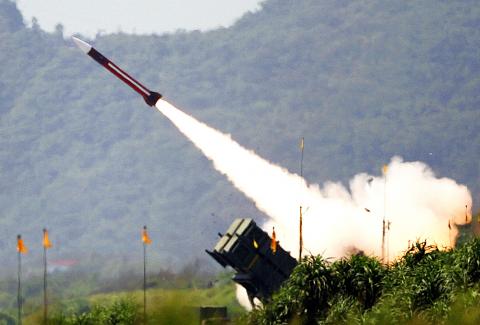A US defense contractor yesterday denied local reports that efforts by Taiwan to procure two additional PAC-3 air defense batteries were jeopardized by political bickering and a lack of funds.
The Chinese-language United Daily News on Monday wrote that since the US had agreed to sell two additional Patriot Advanced Capability-3 (PAC-3) systems in January last year, the military had had difficulty raising enough money to complete the deal, as the cost of acquisition allegedly exceeded the military’s budget by as much as 40 percent.
The report cited military sources as saying that the military had lobbied the Pentagon to lower the price for the two batteries on several occasions, but that little progress had been made, adding that the Ministry of National Defense would have to increase its budget for the acquisition and that delivery could be deferred.

Photo: Reuters
US authorities have warned Taipei that if it failed to make any progress by the end of this year, the purchase price could be -invalidated and subsequent orders could be higher, the report said.
The two firing units are part of the US$6.4 billion arms package agreed by the administration of US President Barack Obama in January last year. In addition to fire units, one training unit and 114 PAC-3 missiles were included in the US$2.8 billion deal.
The two batteries are to complete a total of six PAC-3 defense systems sought by Taiwan following notification in October 2008 of four fire units and 330 PAC-3 missiles for US$3.1 billion.
At the heart of the alleged funding shortfall is the three-year boycott by the Chinese Nationalist Party (KMT) of the NT$120 billion (US$4.14 billion) budget for the missile defense program in the legislature from 2004 until 2007, the paper said. When the budget was finally released in 2007, Taiwan discovered that the unit cost for the PAC-3 system had gone up substantially. Legislators later claimed that cost overruns, estimated at US$800 million, were added to a draft of the letter of acceptance (LOA) for the 2008 deal, resulting in further delays.
Contacted for comment, an official at Raytheon, the US defense firm that manufactures the Patriot ground systems, said it was their understanding that the purchase of the two fire units was “on track.”
That position was echoed by a US-based source familiar with the situation, who told the Taipei Times last night that the program was in the final stages and on schedule to be signed this fall.
The ministry on Monday denied the reports and said it was proceeding with the purchase.
Raytheon and Lockheed Martin Corp, the maker of the “hit-to-kill” PAC-3 missile, are the two principal firms involved in the sale.
Taiwan is scheduled to field the first four PAC-3 batteries by 2014. Raytheon is also in the process of upgrading Taiwan’s three PAC-2 missile batteries, acquired in the 1990s, to PAC-3 configuration.
The ministry was forced to deny similar rumors in May after KMT Legislator Lin Yu-fang (林郁方) claimed that budgetary issues could force delays to three major procurement programs — UH-60 Black Hawk helicopters, AH-64D Apache Longbow attack helicopters and the PAC-3 batteries.

CHAOS: Iranians took to the streets playing celebratory music after reports of Khamenei’s death on Saturday, while mourners also gathered in Tehran yesterday Iranian Supreme Leader Ayatollah Ali Khamenei was killed in a major attack on Iran launched by Israel and the US, throwing the future of the Islamic republic into doubt and raising the risk of regional instability. Iranian state television and the state-run IRNA news agency announced the 86-year-old’s death early yesterday. US President Donald Trump said it gave Iranians their “greatest chance” to “take back” their country. The announcements came after a joint US and Israeli aerial bombardment that targeted Iranian military and governmental sites. Trump said the “heavy and pinpoint bombing” would continue through the week or as long

TRUST: The KMT said it respected the US’ timing and considerations, and hoped it would continue to honor its commitments to helping Taiwan bolster its defenses and deterrence US President Donald Trump is delaying a multibillion-dollar arms sale to Taiwan to ensure his visit to Beijing is successful, a New York Times report said. The weapons sales package has stalled in the US Department of State, the report said, citing US officials it did not identify. The White House has told agencies not to push forward ahead of Trump’s meeting with Chinese President Xi Jinping (習近平), it said. The two last month held a phone call to discuss trade and geopolitical flashpoints ahead of the summit. Xi raised the Taiwan issue and urged the US to handle arms sales to

State-run CPC Corp, Taiwan (CPC, 台灣中油) yesterday said that it had confirmed on Saturday night with its liquefied natural gas (LNG) and crude oil suppliers that shipments are proceeding as scheduled and that domestic supplies remain unaffected. The CPC yesterday announced the gasoline and diesel prices will rise by NT$0.2 and NT$0.4 per liter, respectively, starting Monday, citing Middle East tensions and blizzards in the eastern United States. CPC also iterated it has been reducing the proportion of crude oil imports from the Middle East and diversifying its supply sources in the past few years in response to geopolitical risks, expanding

Pro-democracy media tycoon Jimmy Lai’s (黎智英) fraud conviction and prison sentence were yesterday overturned by a Hong Kong court, in a surprise legal decision that comes soon after Lai was jailed for 20 years on a separate national security charge. Judges Jeremy Poon (潘兆初), Anthea Pang (彭寶琴) and Derek Pang (彭偉昌) said in the judgement that they allowed the appeal from Lai, and another defendant in the case, to proceed, as a lower court judge had “erred.” “The Court of Appeal gave them leave to appeal against their conviction, allowed their appeals, quashed the convictions and set aside the sentences,” the judges